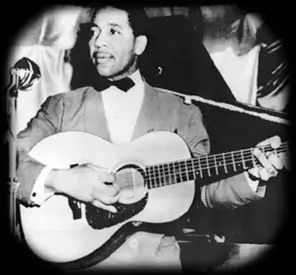LONNIE JOHNSON
 Guitar maestro Lonnie Johnson didn’t thrash his axe like a Delta field-hand or finger delicate chord patterns like a Piedmont rag-picker, but the early guitar stylists like Robert Johnson, T-Bone Walker and the Three Kings, BB, Freddie and Albert would all recognise the trail that Lonnie blazed. His single-string style was precise and thoughtful, giving a swinging variation to the tune that defined what ‘lead-guitar’ would become. He was one of the very first Bluesmen to make a record and travelled as a session player with the Okeh field recording crew when they made their early ventures into the South. Lonnie had a fine solo career, but is best remembered for the hundreds of great guitar lines he contributed to other Blues stars’ work. Later he toured Europe with the American Blues Festivals, and he was still playing in 1969.
Guitar maestro Lonnie Johnson didn’t thrash his axe like a Delta field-hand or finger delicate chord patterns like a Piedmont rag-picker, but the early guitar stylists like Robert Johnson, T-Bone Walker and the Three Kings, BB, Freddie and Albert would all recognise the trail that Lonnie blazed. His single-string style was precise and thoughtful, giving a swinging variation to the tune that defined what ‘lead-guitar’ would become. He was one of the very first Bluesmen to make a record and travelled as a session player with the Okeh field recording crew when they made their early ventures into the South. Lonnie had a fine solo career, but is best remembered for the hundreds of great guitar lines he contributed to other Blues stars’ work. Later he toured Europe with the American Blues Festivals, and he was still playing in 1969.
Lonnie Johnson was born into a music-filled house in New Orleans and as a child he played violin in his father’s string band. He also learned banjo, mandolin and piano and, in 1917, he went to London as part of a musical revue. When he returned two years later, he found his parents and all but one of his many siblings had perished in the flu epidemic that devastated the world in that year. He left New Orleans with his remaining brother and they settled in St. Louis, working in jazz bands on the steamboats. In 1925, Okeh records organised a talent contest in St. Louis and Lonnie’s prize for winning was a recording deal.
This may be the first guitar solo ever recorded;
Over the next seven years, Lonnie appeared on over 130 tracks and was one of the most recorded artists of his time. His bright, clear tenor voice and clever playing gave him several hits, but his best work came in guitar duets with Eddie Lang that showed off Lonnie’s effortless extemporising. He recorded with Duke Ellington’s Orchestra, contributing a stunning solo to ‘The Mooche’, and in 1927 with Louis Armstrong‘s Hot Five, he traded licks with Satchmo’s cornet on ‘Savoy Blues’ and ‘Hotter Than That’ where the guitar was a featured solo instrument rather than part of the rhythm section. Entire generations of Blues and jazz guitarists took inspiration from these recordings and their influence is still with us today. Okeh records used Lonnie’s talents in the studio as their ‘go-to’ guitarist and Divas like Victoria Spivey and Bluesmen like Texas Alexander were among the many whose work was embellished by his backing.
As ‘Sonny Boy II’ said, “Lonnie put the ‘soul’ into solo”;
Lonnie has a great voice too;
Lonnie made a living from playing the Blues well past the usual retirement age, touring Europe and playing the Festival circuit to great acclaim. In 1969 he was in Toronto when he was hit by a car and he never really recovered, dying from complications the following year.